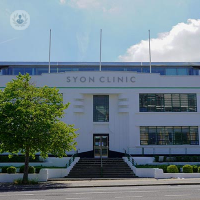Colposcopy
Dr Karin Hellner - Obstetrics & gynaecology
Created on: 12-09-2014
Updated on: 07-31-2023
Edited by: Carlota Pano
What is colposcopy?
Colposcopy is a procedure which allows the cervix (the neck of the womb) to be examined, using a device called a colposcope, which illuminates and magnifies the area.

Why is colposcopy performed?
Colposcopy is most commonly performed after a cervical smear which has shown some presence of abnormal cells. A cervical smear is a routine procedure offered to women between 25 and 65 years of age, during which a cell sample is taken from the cervix, and is later examined in order to detect any changes in the cervix and if any abnormal cells are present.
Colposcopy may also be performed if smear results are consistently inadequate, or for other reasons such as bleeding between periods (inter-menstrual), bleeding experienced after sexual intercourse, or an abnormal or unusual appearance of the cervix.
What do abnormal results mean?
If the investigation is for abnormal cells, they are generally regarded as being pre-cancerous, which means if they are left untreated, they could become cancerous in the future.
However, if the abnormal cells are found at this early stage, the chances of cancer developing are very small. The cells may develop, but usually over a number of years, meaning they can be treated quickly and easily. It is important for women to be reassured that there is very little need to worry, and in 90 per cent of cases, the pre-cancerous condition is eliminated.
What does colposcopy involve?
The procedure is actually similar to the smear test procedure, but takes longer, as the colposcopy looks for any abnormalities through the application of various solutions to the cervix. Colposcopes can also be used to examine the vagina and vulva.
A colposcopist inserts a speculum into the vagina, which dilates it and allows for examination both in the vagina and cervix.
Usually when the colposcopy is performed because of abnormal smear results, the colposcopist will apply a small amount of acetic acid (vinegar) to the cervix with cotton wool. This solution allows the specialist to see any changes in the epithelium (the skin covering the cervix) more clearly.
On some occasions, the colposcopist may wish to take a biopsy, which is a small sample of tissue, from the cervix (usually the size of a grape pip). When the biopsy is taken, it may cause a small amount of bleeding, but this can be controlled by applying silver nitrate to the affected area. Once the bleeding has stopped, the examination is over. The biopsy is then sent to be tested and analysed by the pathologist.
How does it feel during the test?
Both the application of vinegar and the application of the silver nitrate solution may cause stinging and a certain amount of discomfort. However, the procedure only takes about 15 minutes, so it is not long.
How to prepare for colposcopy
- Avoid having sexual intercourse the day before the colposcopy
- Do not put anything into your vagina (e.g tampons or medicines) in the 24 hours leading up to the test
- Schedule the test for when you are not due to come on your period
- Some women prefer to wear a panty-liner as they may experience slight bleeding or discharge after the colposcopy
- Contact the clinic if you are pregnant – colposcopy is safe during pregnancy, but it is important to note that the biopsy and treatment are usually delayed until after you have given birth

















